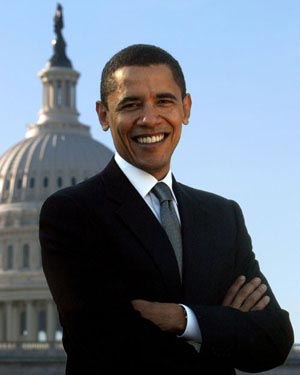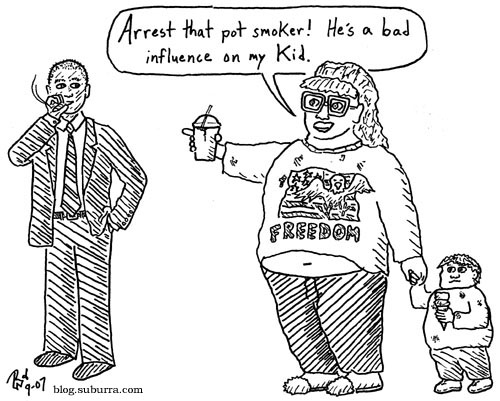Some interesting drug policy debates are suddenly opening up in the US presidential race, as detailed in an article in today's Washington Times, with Barack Obama confirming his position in support of decriminalising cannabis possession:

Last fall during a nationally televised presidential debate, Sen. Barack Obama hesitantly raised his hand and joined with most of his Democratic rivals to declare that he opposed decriminalizing marijuana.
But as a candidate for the U.S. Senate four years ago, Mr. Obama told Illinois college students that he supported eliminating criminal penalties for marijuana use or possession, according to a videotape of a little noticed debate that was obtained by The Washington Times.Obama's clarification on this issue throws down a gauntlet for Democratic candidate rival Hilary Clinton. If she attacks him for being 'soft on drugs' or for flip-flopping, Obama could recite to her Bill Clinton's valedictory interview with Jann Wenner (Rolling Stone's Dec. 28-Jan. 4, 2001 issue) when he also advocated decriminalisation and criticised mandatory minimums.
"I think we need to rethink and decriminalize our marijuana laws," Mr. Obama told an audience during a debate at Northwestern University in 2004. "But I'm not somebody who believes in legalization of marijuana."
Asked about the two different answers, Mr. Obama's presidential campaign said he in fact has "always" supported decriminalizing marijuana as he answered in 2004, meaning the candidate mistakenly raised his hand during the presidential debate last fall.
That position leaves Mr. Obama as the lone presidential candidate among the four leading challengers in either party who supports eliminating criminal penalties for marijuana. Mr. Obama's chief rival for the Democratic nomination, Sen. Hillary Clinton, opposes decriminalization, Clinton campaign spokesman Phil Singer said.
Obama: Decriminalize pot. Jan Heberkorn Jan 31,2008
Rolling Stone: Do you think that people should go to jail for possessing, using or even selling small amounts of marijuana? Is that appropriate?
Clinton: I think, first of all -
Rolling Stone: We're not publishing this until after the election.
Clinton: I understand that. I think that most small amounts of marijuana have been decriminalized in some places, and should be.
In another recent sign of shifting political sands across the pond the issue of Obama's former drug use, which he had openly described in published writing, became a political issue but not in the way that might be expected. It was raised by one of Hilary Clinton's aides, apparently seeking to make political capital, only for the attack to backfire and result in the aide's resignation, as reported on CNN:
One of Sen. Hillary Clinton's top advisers is stepping down after saying Sen. Barack Obama's admission of past drug use would hurt his chances in a general election matchup.Contrast this contrition and political positioning with the current policy debate in the UK, where the clashes between key political players are all about who is keenest to actually increase prison sentences for cannabis possession. Yes mass-criminalisation of young people has become the latest currency in the UK's party-political 'tough on crime' bidding war. Even in the US (the spiritual home of precisely the kind of old-school drug war rhetoric and posturing that characterises much of the current UK discourse) the debate, and legislation, appears to be making some progress (cannabis is already effectively decriminalised - now a finable offence only - in a number of states, and mandatory minimums are being reduced and/or abolished)."I would like to reiterate that I deeply regret my comments yesterday and say again that they were in no way authorized by Sen. Clinton or the Clinton campaign," Bill Shaheen, co-chairman of the Clinton campaign in New Hampshire, said in a statement announcing his decision.
Earlier Thursday, Clinton personally apologized to rival Obama for Shaheen's remarks.
Obama accepted her apology, according to David Axelrod, the top political strategist for the Obama campaign....
"The Republicans are not going to give up without a fight ... and one of the things they're certainly going to jump on is his drug use," Shaheen [had] said. "It'll be, 'When was the last time? Did you ever give drugs to anyone? Did you sell them to anyone?' There are so many openings for Republican dirty tricks. It's hard to overcome."
When we are actually lagging behind the US in drug law reform debate you really have to wonder where our leaders are trying to lead us.
UPDATE July 2008: Obama has obviously now won the democrat nomination, so the Clinton issues are now behind us, to be replaced with more familiar Republican /Democrat policy tensions that will, if history is any guide, pull Obama to the political right. However in a recent Rolling Stone interview Obama hints that he is open to a paradigm shift in drug policy away from some of the extreme Drug War responses and refocusing on public health.





















